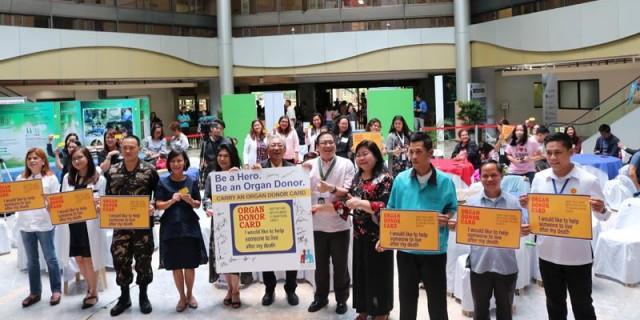‘The doctor might not save me’ plus 9 other myths about being an organ donor
Mortality is not something people like to think about and it's not a stretch to say that many of us are more concerned about leaving a legacy. But what is a legacy? Living beyond our biological body? How does one to do that?
A number of people have made a decision to celebrate the continuity of life by carrying an organ donor card. Once they pass away, they will be able to give the gift of life to others and, in a way, to themselves as well.
Unfortunately, fewer and fewer people are making this choice to do one final act of kindness.
The Human Organ Preservation Effort (HOPE) of the National Kidney and Transplant Institute identified common myths about being an organ donor.

MYTH: My body will be damaged if I donate an organ
FACT: Organ donors will be cared for by professionals. As former president Fidel V. Ramos has proven, people live long and healthy lives with just one kidney.
Organ donors also undergo rigorous medical examination to make sure that they are healthy enough to donate and they will continue to be healthy after the surgery.
MYTH: It's costly
FACT: The recipient of the organ will be shouldering the cost of the donor's work-up, hospital expenses for the donation, and laboratory fees after the donation. This is because the donor will already be giving the "gift of life", which means their family does not have to worry about a thing.
MYTH: It's against certain religions to donate organs
FACT: All major organized religion — Christianity, Islam, Buddhism, Hinduism, Judaism, Sikhism — consider organ donation as a generous act and most even encourage this "genuine act of love."
MYTH: You sign away all your organs if you carry an organ donor card
FACT: While it is true that you save more lives by donating all of your organs as a deceased donor, you may specify which organs you want to donate on the back of the organ donor card. "Walang pilitan," as the adage goes.
MYTH: If I'm carrying an organ donor card and I get into an accident, the doctors will not try to save my life
FACT: Your family will make the final decision about the donation, not the doctors. In addition to this, the medical team that will be responding to the accident is not the transplant team and the latter will not be notified until all life-saving efforts have failed and death has been determined. The job of every doctor is always to save the life of a patient, and that includes the life of a potential donor.
MYTH: Only wealthy patients receive transplants
FACT: Any patient who is registered in the National Deceased Donor Waiting List may receive a transplant. This list is maintained by the Department of Health through the Philippine Network for Organ Sharing (Philnos).
MYTH: "I am too young or too old to donate"
FACT: Even newborns can become organ donors. There are no longer any age limits for organ donation.
MYTH: "I have a history of medical illnesses and my organs are not healthy enough to be donated"
FACT: At the time of death, the transplant team will review your medical history to determine if you can be a donor.
MYTH: A brain dead donor will feel pain when the doctors remove his organs for donation
FACT: Consent for donation may only be given once brain function ceases and therefore, the patient can no longer feel pain.
10. MYTH: Only the heart, liver, and kidneys can be transplanted
FACT: The eyes, lungs, pancreas, small and large intestines, bones, and other tissues can be transplanted. It is highly encouraged that people donate all of their organs to help save more people.
Becoming an organ donor is one click away. Simply visit the official Organ Donor Card Facebook page and download then print a copy of the card. — LA, GMA News




